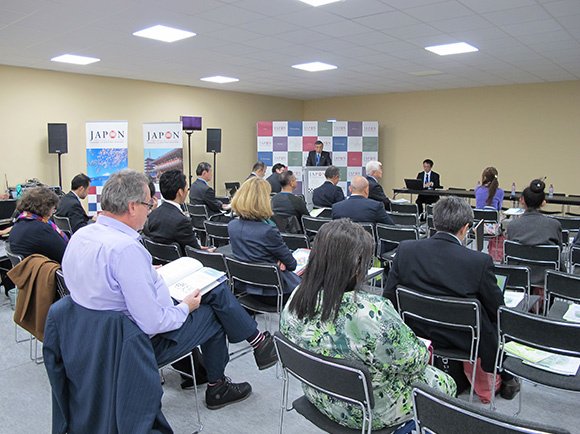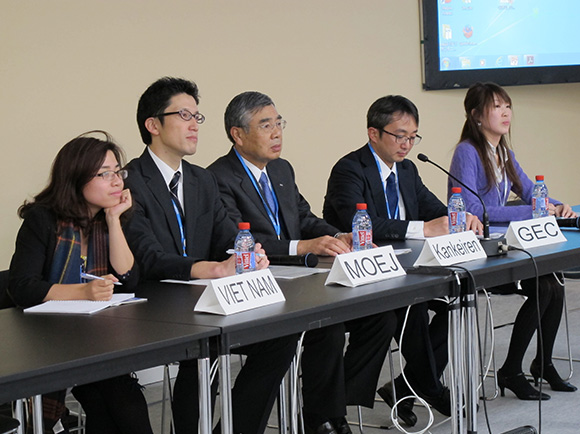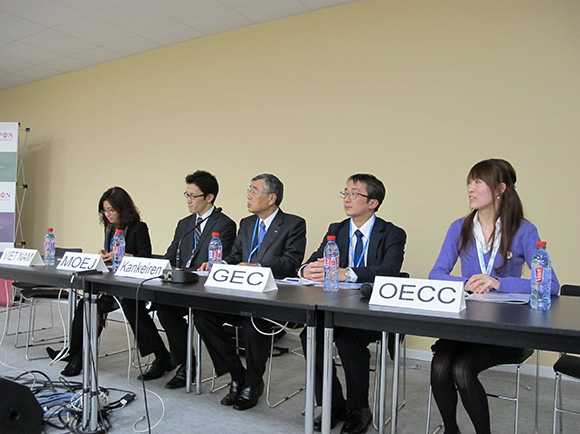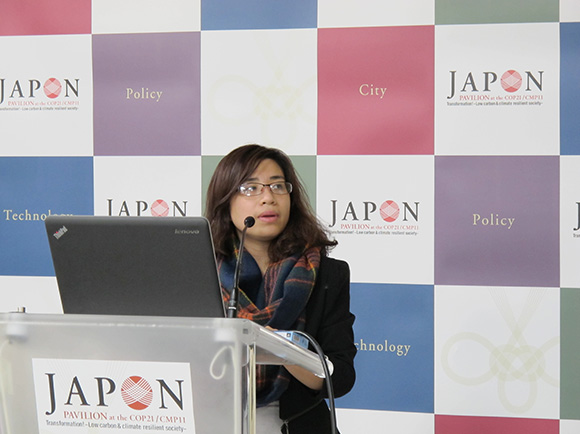Advanced Technologies to Tackle Climate Change: Application of the JCM and Project Development
Global Environment Centre Foundation (GEC); Kansai Economic Federation (Kankeiren); Overseas Environmental Cooperation Center, Japan (OECC)
Outline
One of the effective measures for Japan’s contribution to climate change mitigation is the application and further diffusion of advanced technology, as stated in the “Proactive Diplomatic Strategy for Countering Global Warming” by the Government of Japan. For private companies, it creates new business opportunities that expand the application of their advanced low-carbon technologies to developing countries.
This event will introduce and discuss about the advanced low-carbon technologies owned by private companies mainly based in western Japan, and the application of the Joint Crediting Mechanism (JCM) for international diffusion, as well as the JCM MRV procedures (methodologies) and JCM crediting. The Secretariat of the New Mechanisms Information Platform will make an update on the latest information and introduce answers pertaining to frequently asked questions on the JCM.
Program
-
- Opening Remarks
- Dr. Hiroshi Sato, Vice-President, Kankeiren, and Chairman, Kobe Steel, Ltd. (KOBELCO)
-
- Kansai Business Sector’s Contribution to Climate Change Mitigation and Adaptation
- Mr. Minoru Furukawa, Chairman of Global Environment and Energy Committee, Kankeiren, and Chairman & CEO, Hitachi Zosen Corporation (Hitz)
-
- GEC’s Contribution to the JCM
- Dr. Osamu Bannai, Assistant Manager, GEC
-
- Viet Nam – Japan Joint Crediting Mechanism
- Ms. Nguyen Thanh Hai, JCM Secretariat, Ministry of Natural Resources and Environment, Viet Nam (MONRE)
-
- Answers Pertaining to Frequently Asked Questions on the JCM
- Ms. Yuriko Koyanagi, Researcher, OECC
-
- Diffusion of Low-Carbon Technology through the Joint Crediting Mechanism
- Mr. Takaaki Ito, Deputy Director, Ministry of the Environment, Japan (MOEJ)
-
- Q&A
Summary
Dr. Hiroshi Sato from Kansai Economic Federation (Kankeiren) made opening remarks and highlighted that Kansai business sector contributes to address both climate change mitigation and adaptation.
Mr. Minoru Furukawa from Kankeiren emphasized about Kansai’s efforts to contribute to resolve environmental problems through its strengths in the “environmental field” and “natural disaster prevention field”, and introduced a leaflet of Kankeiren summarizing advanced environmental technologies and products of Kansai business sectors. He also explained the progress of JCM model project of biogas utilization in wholesale market in Ho Chi Minh City (HCMC), Viet Nam.
Dr. Osamu Bannai from GEC introduced a Study programme for JCM project and city to city collaboration project in HCMC. He also explained the summary of the feasibility studies implemented in Viet Nam.
Ms. Nguyen Thanh Hai from JCM Secretariat, MONRE, Viet Nam introduced an overview of the JCM in Viet Nam and achievements of the JCM projects.
Ms. Yuriko Koyanagi from OECC introduced the answers pertaining to frequently asked questions on the JCM, which was newly launched in the website of the New Mechanisms Information Platform (URL: http://www.mmechanisms.org/e/initiatives/faq.html). She shared the answers to the following questions: the duration of project registration; net decrease/avoidance to ensure environmental integrity; allocation of the issued JCM credits; the JCM beyond 2020; prevention of double counting; the JCM’s compliance with the WTO rules.
Mr. Takaaki Ito introduced overview of JCM and diffusion of leading Low-carbon technology through JCM, and emphasized the importance of developing actual projects.
Key Messages
- Becoming JCM partner countries is not a goal, but only a starting point. Now that the target of signing with 16 countries by 2016 has been achieved ahead of schedule, the Government of Japan emphasizes the importance of developing actual projects. The Government of Japan estimates 50-100 million t-CO2 emission reduction through JCM by 2030.
- It is necessary to cooperate with private sectors to facilitate diffusion of advanced low carbon technologies.
- The first JCM project was registered in Viet Nam this year, and it is expected that more JCM projects will be implemented and JCM credit will be issued in the near future.
Photograph
Reporters
Osamu Bannai, Global Environment Centre Foundation (GEC)
Yuriko Koyanagi, Overseas Environmental Cooperation Center, Japan (OECC)








